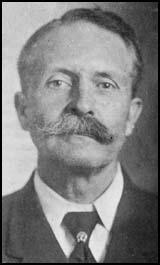Bill Tilghman

William Tilghman was born in Fort Dodge, Iowa, on 4th July, 1854. Later the family moved to a homestead in Atchison, Kansas.
After leaving home at the age of fifteen, Tilghman became a hunter of animals and over a five year period claimed he killed 12,000 buffalo. This brought him into conflict with local Native Americans and during one skirmish in September 1872 Tilghman killed seven Cheyenne braves. Two years later he narrowly escaped being lynched after he was falsely accused of murdering a man in Granada, Colorado.
In 1875 Tilghman, although a life long teetotaler, opened a saloon in Dodge City. Three years later he accepted the offer of his friend, Bat Masterson, to become his deputy sheriff. Tilghman developed a reputation as a courageous and honest lawman and later became marshal of Dodge City.
Tilghman moved to Oklahoma in 1889 and after establishing a homestead at Guthrie he was appointed as a deputy United States marshal. Unlike other lawman, Tilghman rarely resorted to using violence and during his career killed only two criminals in gunfights. Tilghman, Heck Thomas and Chris Madsen became known as the Three Guardsmen and were largely responsible for wiping out organized crime in Oklahoma. This included the hunting down of Bill Doolin and his gang.
It is claimed that Tilghman was paid more reward money than any other law officer. Another famous lawman, Bat Masterson, described Tilghman as "the greatest of us all".
After retiring as a marshal in 1910, Tilghman was elected to the State Senate. However, he missed life as a lawman and in 1911 became chief of police of Oklahoma City. He also worked as an adviser on the motion picture, The Passing of Oklahoma City Outlaws (1915). In this role Tilghman attempted to persuade the director not to represent the outlaws as heroes as this might gain them the admiration of young boys.
In 1924, Tilghman aged 70, was appointed marshal of Cromwell. On 1st November, 1924 Bill Tilghman was killed while trying to arrest Wiley Lynn, a corrupt prohibition officer.
